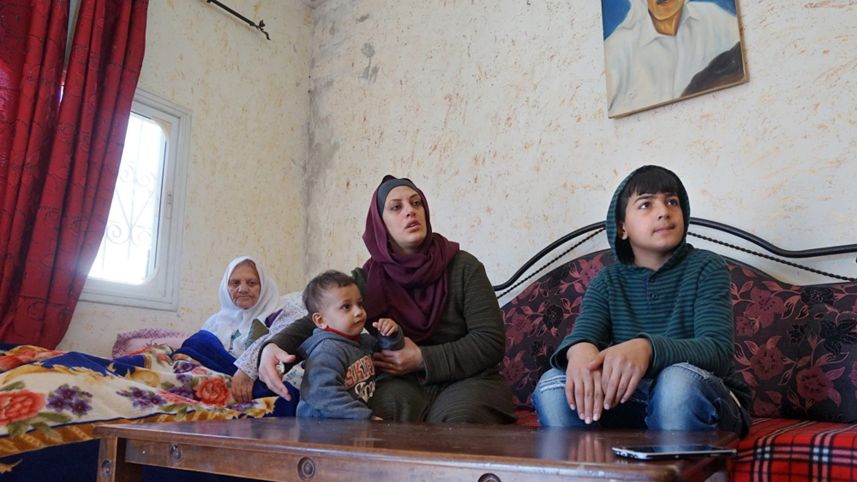
Issa al-Mouati’s family. Alex Levac
A boy amputee arrested by soldiers in the dead of night in the refugee camp where his grandmother lives. A boy amputee beaten during his interrogation on the back and leg, until his prosthesis is wrenched out of place. A boy amputee in military prison.
The interrogators recoiled in horror at the sight of the prosthesis, his mother says now, relating what her son told her when she met him in a military court during his remand hearing on Sunday; he had been held at that point for four days in a military prison.
Two days ago, on Wednesday, he was finally released without bail and arrived home in the evening.
The boy amputee had been sent once again to military prison 18 months after being shot in both legs by Israeli soldiers. After he’d been hospitalized for two-and-a-half months in Hadassah Medical Center in Ein Karem, Jerusalem, the physicians had had no choice but to amputate one leg. Following a protracted rehabilitation period, he was fitted with a prostheses in Detroit, where he was sent on his own. The boy amputee who was 12 years old when he was wounded and is now 14.
Issa al-Mouati, 14.Reproduction by Alex Levac
A boy amputee with a prosthetic leg, in Ofer Prison, near Ramallah. Words fail.
Issa al-Mouati should be in ninth grade but he’s in sixth – at least in part because he missed so much school due to his hospitalization and rehabilitation. His parents, Rada and Ahmed, both 35, live in Bethlehem, but Issa was arrested last Thursday in the nearby Deheisheh refugee camp, outside the home of his ailing grandmother, where he and Rada were spending the night. For the past few months, the daughters of 80-year-old bedridden Grandmother Amina have been taking turns sleeping there.
It is there that we met Rada this week. Her mother lies unmoving in an iron bed next to the living room wall. From time to time the perspiration is wiped from her face, occasionally she whispers something. She’s suffering from elephantiasis, a condition that causes the legs to swell enormously.
This week, Rada was constantly on the move between her young children at home, her sick mother and the military court to which her son was brought twice for remand. Issa is her eldest; she has two other sons and a daughter. The ordeals of the past few years have exhausted her.
Deheisheh, south of Bethlehem, is a crowded, hardscrabble refugee camp. The grandmother’s home is on the second floor of a house next to the camp’s great mosque. At midday the narrow alleys are packed with children and many young people who have nowhere to be. The walls everywhere are covered with militant graffiti. Every stranger elicits instant suspicion and hostile glances.
Issa was originally wounded in September 2015. It was a Friday, and Issa and his younger (by one year) brother, Adnan, were on the way to a small park next to the security barrier around the city. Hearing that clashes were underway next to Rachel’s Tomb, they hurried there. Toward evening, Issa was hit in both legs with live fire from Israeli soldiers. The wound in his right leg was very serious. Issa was arrested and, according to his mother, was held for half an hour before an Israeli ambulance took him to Hadassah.
Deheisheh refugee campAlex Levac
For the first 28 days of his hospitalization, Issa was in detention, both hands shackled to his bed, his legs wounded. In a rare move, his mother was permitted to stay with him, possibly because of the seriousness of the injury and his young age. During the second week, the soldiers even let her sleep in the bed next to his – something not permitted during the first week. She did not leave Issa’s bedside during that period. Her husband, who is a worker in a nearby settlement, looked after the other children, including a 10-week-old infant, together with his mother. After four weeks, Issa, who still needed to be hospitalized, was released from detention on bail of 2,000 shekels (about $500).
During his hospitalization, his right leg was amputated in stages, beginning with the foot. The physicians apparently made every effort to save the leg, but gangrene forced them to cut it off below the knee. Issa was discharged from the hospital on December 1, 2015.
Musa Abu Hashhash, a field researcher for B’Tselem, who has worked for the Israeli human rights organization for 17 years and has seen a thing or two of the occupation’s horrors, says he never met a boy as forlorn as Issa was when he left the hospital, crippled for life. “He was the saddest boy I ever saw in my life. I will never forget the sight,” Abu Hashhash said this week.
Two weeks after returning home, Issa slipped in the shower, injuring his stump. His mother was unable to obtain a permit for him to go to Hadassah; he was treated at Al-Hussein Hospital in Beit Jala, near Bethlehem, and in the rehabilitation hospital in the same town. Last August, it was decided to send him to a rehabilitation hospital in Detroit, Michigan, for a prosthetic leg, with expenses covered by charity.
At 13, Issa was sent to the United States all by himself. A Palestinian family in Detroit helped him in the hospital. A photo taken in America shows him with a bashful smile, his new leg not yet fitted. He returned about a month later with the prostheses, which he found very difficult to adjust to at first. It also broke twice, his mother relates, and then he had to go back to crutches.
This year, Issa went back to school. Life gradually resumed a semblance of normality for this disabled Palestinian boy from an impoverished family. According to Rada, however, he’s become a tense, irritable boy who quarrels with everyone and then closets himself for hours in his room. Does he cry there? She doesn’t know.
At about 2 A.M. last Thursday, Rada woke up in her mother’s house to the sounds of stun grenades being fired and the acrid odor of tear gas that entered the house from the street. Special forces raided the refugee camp that night in one of the Israel Defense Force’s frequent operations to arrest local residents. As always, clashes erupted between young people and the soldiers.
After a time, it seemed to Rada that the soldiers had left, and she went outside with Issa, who had of course woken up, like the whole camp. But the special forces were still there. Rada has no idea what transpired in the dark of the night, but very quickly it became clear that Issa had at some point been arrested along with six other youngsters. Her son was the youngest of the group. In the morning, she learned that he had been taken for interrogation to the Etzion facility and from there to Ofer Prison.
The IDF Spokesperson’s Unit was asked to reply to the following questions this week:
1. Why was Issa al-Mouati arrested?
2. Did the soldiers who arrested him know that he’s an amputee in the wake of being shot by the IDF?
3. Were his interrogators aware of this?
4. He told his lawyer that he was struck on the back and kicked in his prosthetic leg, dislodging it. Your response?
5. Did the court that remanded him in custody at Ofer Prison on Sunday not know that he’s an amputee?
The IDF Spokesperson’s Unit provided the following reply: “At 3 A.M. on March 2, 2017, during operational activity by security forces in the Deheisheh refugee camp, a violent disturbance of the peace erupted with the participation of Palestinians, who threw stones, Molotov cocktails and improvised grenades at the soldiers. The forces arrested a number of individuals, among them Issa al-Mouati, who was one of the active participants in the disruption. Issa’s medical situation was not known to the forces and he was transferred for continued interrogation to the police.”
On Sunday, Issa’s lawyer, Tareq Barghout, requested that the boy be released, because of his disability. The prosecution objected. It was agreed that the family would submit medical documentation to the court proving that he is an amputee. On Tuesday, the court convened again to discuss his case. The following day, after six days in jail, he was finally sent home.
The Israel Police said in response that “the suspect was arrested for throwing stones and violent disturbances during a riot in which firebombs, grenades and makeshift explosive devices were thrown at the fighters. The suspect took an active part in that activity despite his disability.
“Following his arrest, he was taken in for questioning by the police, and the court extended his remand. A few days ago he was released with restrictions. An inquiry found that no force was used during questioning, and we aren’t familiar with such a claim being raised during the questioning or the court hearings. Due to a claim he raised regarding his medical condition, he was asked to provide medical documents that would allow for treatment during his detention. The case will soon be transferred to the prosecution for the purpose of indictment.”




